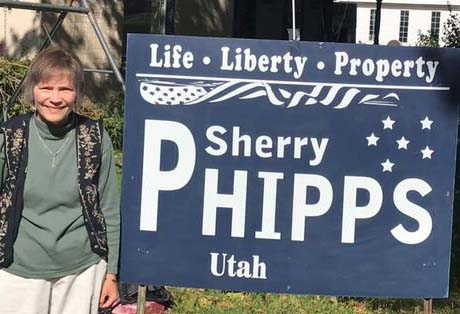
Sherry Phipps of Brigham City is representing the Constitution Party in the ongoing race for the 1st District seat in the Utah House of Representatives.
BRIGHAM CITY – The political competition in Utah’s 1st House District is an unusual three-way race, with Constitution Party candidate Sherry Phipps joining incumbent GOP state Rep. Joel Ferry and Democrat Amber Hardy in the running.
Phipps quickly got to the point of her candidacy during a political forum hosted by the Cache Valley Chamber of Commerce on Tuesday.
“The major plank in my platform,” she explained, “is to rescind Utah’s call for a (national) constitutional convention.”
A resident of Brigham City, Phipps is a perennial candidate for the Constitution Party in local political races. In 2012, she ran against incumbent U.S. Rep. Rob Bishop to represent Utah’s 1st Congressional District. In 2016, she ran unsuccessfully for the 1st District seat in the Utah Legislature. That district includes the northwestern portion of Cache County, including the communities of Clarkston, Newton and Cornish.
According to the Colorado Fiscal Institute, Utah is one of 28 states that have called for a national constitutional convention to draft a balanced budget amendment that would be imposed on the U.S. federal government.
As recently as 2019, the Utah Legislature reaffirmed that call by passing a joint resolution advocating a national balanced budget amendment and an end to unfunded federal mandates.
Although many members of the Constitution Party generally favor federal fiscal restraint, they officially oppose a national constitutional convention on the grounds that such a gathering “could easily go astray.”
Founded in the 1990s, the Constitution Party was previously known as the U.S. Taxpayers’ Party. The party espouses platforms and policies based on the principles of life, liberty, property, family, state’s rights, American sovereignty, the U.S. Constitution and the Bill of Rights.
“Our Legislature has been duped into believing that a constitutional convention can be controlled …” Phipps explained. “The only constitutional convention in American history is the one that was held in 1787. The delegates who were sent to that convention were only supposed to amend the Articles of Confederation. Within two days after convening, the Articles of Confederation were thrown out.”
Phipps believes that, if a national constitutional convention were called today, lobbyists and special interest groups might tempt its delegates into making fundamental changes to the U.S. Constitution.
“The U.S. Constitution is not broken …” she argued. “When a document is divinely inspired, great caution should be taken before amending it.”
Phipps is not alone in that opinion. Both liberal and conservative Supreme Court jurists have warned that a national constitutional convention could make the U.S. Constitution vulnerable to radical and harmful changes.
More than 30 years ago, former Chief Justice Warren Burger suggested that the agenda of a constitutional convention that was called for a single issue could veer in other directions, particularly under the influence of special interest lobbying. The late Justice Antonin Scalia voiced similar concerns as recently as 2014.
“For these reasons,” Phipps said, “the Utah Legislature needs to rescind its calls for a constitutional convention as the state of Nevada has done recently.”
Northern Utah voters will choose between Phipps, Hardy and Ferry in the general election balloting to be held on Nov. 3.

